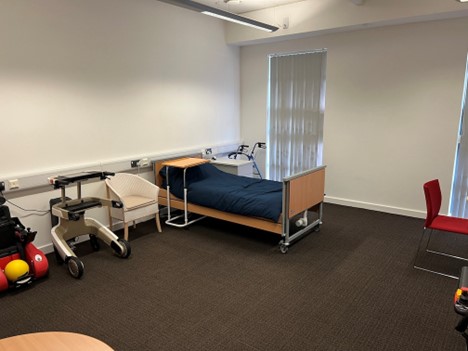02
02
.23
Partway through Open All Senses
We are now half-way through the Open All Senses project and have been focusing on identifying the legal, ethical and social challenges of using telepresence robots in public spaces, using simulated healthcare and museum settings at the Cobot Maker Space, University of Nottingham.
To address the potential social impact, ethical and legal risks, we began by exploring, summarising and evaluating what is currently known about the use of telepresence robots in public, semi public and private spaces. We then ran a workshop to start discussions around this topic with stakeholders – using responsible research and innovation (RRI) cards developed in the hoRRIzon project.
Based on findings from the workshop, we created questionnaires and have now begun to hold interviews with people who could potentially use, or work in an environment in which telepresence robots operate – to document ethical and social concerns. We will also be asking participants to share opinions and provide visions on how their workspaces could be ideally designed to facilitate the operation of telepresence robots.
To support the future development and deployment of telepresence robots in a way prevents harm and creates trust, we are working on finding technical solutions to mitigate identified risks, including: violating human rights (privacy, dignity, data protection, autonomy), additional legal issues (liability, safety, reliability, security) and the existing legal framework that attempts to address these risks (UK GDPR, AI proposed regulation/guidance).
In parallel to the legal and ethical work stream, we have also been working to develop the simulated healthcare and museum settings at the Cobot Maker Space. Testing in real world environments during development and testing phases of projects provides the best feedback, however is fraught with difficulties. There are legal, ethical, and safety issues that must be considered, and in an experimental setting it can be very difficult to control these. A good second option is to have simulated environments to test in.
There is however a bootstrapping phase, where these simulated environments need to be considered and designed before being implemented, to ensure that they capture the spirit of the original environment. As the simulation rooms at the Cobot Maker Space had not been fully developed, one of the tasks of the Open All Senses project has been to support this phase. For our research purposes, we selected healthcare and museum settings as two environments (the public) would expect to engage with or visit. We used the stakeholder engagement workshops to capture requirements, as well as our own experience of these spaces. The healthcare setting is almost complete and the museum room should be ready within the next couple of months.

Tags:
data protection,
ethics,
GDPR,
hoRRIzon,
hoRRIzon 2.0,
privacy,
robotic telepresence,
RRI,
social impact














